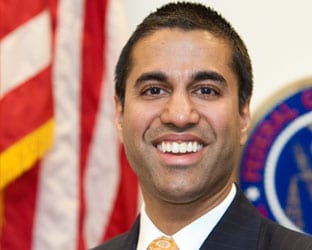In a speech delivered Monday (Oct. 10) to the 2016 Kansas Association of Broadcasters Convention in Wichita, FCC Commissioner Ajit Pai slammed the Commission for its party-line 3-2 decision to retain its 41-year-old newspaper-broadcast cross-ownership rule.
In Pai’s view, the decision “had nothing to do with the facts, nothing to do the law, and nothing to do with common sense. Instead, it was all about politics, and I fear that at the rate we’re going, the newspaper-broadcast cross-ownership rule will outlive newspapers themselves, absent judicial intervention.”
Pai also took an opportunity to share how the FCC’s work on AM revitalization is already paying off — one of the few positive developments that he says has transpired while a Commissioner.
Pai’s comments on the cross-ownership rule came following a discussion on Joint Sales Agreements (JSAs), in which he said he was “particularly disappointed” by the FCC’s decision to re-impose restrictions on JSAs that the U.S. Court of Appeals for the Third Circuit had vacated earlier this year.
“JSAs have produced many public interest benefits throughout the United States,” Pai said. “By enabling stations to share an advertising sales force, JSAs allow broadcasters to operate more efficiently and invest more resources in serving the public.”
He pointed to a JSA in Joplin, Mo., where the agreement “allowed television stations to invest in Doppler radio technology, which saved lives when a devastating tornado destroyed much of the city in 2011.” Pai also pointed to a Wichita JSA between Gray Television’s CBS affiliate and Entravision’s Univision affiliate, which has resulted in the presence of the only Spanish-language broadcast station in this emerging Hispanic market.
“Luckily, Congress has spoken with a strong bipartisan voice on this issue,” Pai said. “They’ve said existing JSAs can continue for nine more years. Thanks to pressure from Congress, these JSAs will no longer be terminated if one of the parties is involved in a merger or transaction. But in my opinion, it shouldn’t have come to that. Stations should be allowed to enter into new JSAs.”
That led Pai to slam the Commission on its cross-ownership ban.
“While we’re on the topic of profound mistakes, I can’t help but mention the FCC’s decision this year to retain the newspaper-broadcast cross-ownership rule,” he said. “Put simply, it makes no sense for the federal government to discourage investment in the newspaper industry. But that’s precisely what the newspaper-broadcast cross-ownership rule does. It’s particularly unfortunate because broadcasters are well-situated to partner with newspapers. The reason is simple: Investments in news gathering are more likely to be profitable when a company can distribute information over multiple platforms.”
This led Pai to paint a “big picture view” of a FCC that has been willing to approve the $13.8 billion purchase of NBC by Comcast and will give an affirmative nod to the $49 billion merger of AT&T and DirecTV).
“And, it will bless a single $79 billion transaction combining our nation’s second, third, and sixth largest cable providers (Charter, Time Warner Cable, and Bright House),” Pai says. “But a newspaper purchasing a single AM radio station in rural Kansas? That’s where the Commission decides to put its foot down!”
Pai also called for an end to the mandate for commercial broadcasters to maintain a public correspondence file by December 31, along with a NPRM on ATSC 3.0 — the new broadcast TV standard scheduled for a February 2017 start.
AM REVITALIZATION ‘ALREADY PAYING OFF’
Commissioner Pai also took time to demonstrate how KPRT-AM 1590 in Kansas City, a Gospel station owned by the Cater family, “should be able to expand its listenership and boost its advertising revenue” thanks to an FM translator obtained during the FCC’s first translator window, in June.
“This story is only one example of how the FCC’s work on AM revitalization is already paying off,” Pai said. “When I called for the FCC to launch an AM Radio Revitalization Initiative at the Radio Show four years ago, I wasn’t sure whether it would get off the ground. As a minority Commissioner, I’ve found that some ideas catch fire while others fizzle. But revitalizing AM radio resonated. Thanks to the support of countless people throughout our country who made their voices heard at the FCC, we finally made it happen. After a lot of hard work, the Commission unanimously adopted AM radio reforms one year ago.”
The end of the second FM translator window is set to conclude at the end of October, Pai notes.
“Some people have asked me why the FM translator issue is so important,” he says. “After all, translators aren’t the answer for the technical problems plaguing the AM band. I agree and have long said that translators aren’t a panacea. But the AM band’s technical issues aren’t going to be solved overnight, and an FM translator can serve as a vital bridge to the future for some AM broadcasters as we work on fixing those problems.”
As of last week, the FCC’s Media Bureau had received 957 applications and already granted 854 of them, Pai says.





